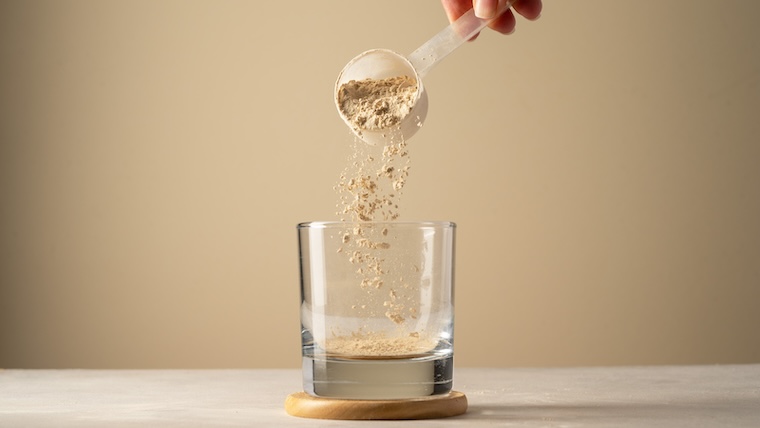Collagen protein’s popularity is increasing. There is support that it can improve skin, hair, and nail health. (1) But is there any scientific evidence that supports collagen protein promotes hypertrophy?
On Aug. 8, 2024, Dr. Layne Norton, Ph.D. in Nutritional Sciences, dove into the efficacy of collagen protein for muscle gains. His analysis is based on a July 2024 randomized controlled trial comparing the effects of collagen, pea, and whey protein concentrate on muscle protein synthesis. (2)
[Related: How Much Caffeine Is in Pre-Workout? (And How Much Is Too Much, According to a Nutrition Coach)]
Participants
The study focused on seniors over 70. Notably, elderly people generally have a weaker muscle protein synthesis response than younger individuals. “It takes more protein in an elderly person to get the same anabolic response as it does in a young person,” explained Norton.
Diet
The participants were given a baseline diet for the first seven days that met the recommended dietary allowance (RDA) for protein. This diet was continued for an additional week, with the addition of either two 25-gram servings of collagen, pea, or whey protein concentrate.
The researchers employed an advanced technique using deuterated water to measure protein synthesis. In deuterated water, the hydrogen atoms are replaced with deuterium, a heavier isotope of hydrogen. (3)

Deuterated water allows researchers to precisely measure the rate of new protein synthesis by tracking how deuterium is incorporated into newly synthesized proteins. Scientists can analyze muscle tissue samples to quantify the deuterium present, directly measuring protein synthesis triggered explicitly by the protein source under investigation.
Results
Whey and pea proteins lead to significantly greater muscle protein synthesis than collagen protein. This is primarily because whey and pea proteins have a higher leucine content than collagen.
A 25-gram serving of whey protein contains 1.68 grams of leucine; pea protein boasts 1.62 grams. Collagen contains 0.7 grams of leucine, less than half the amount in its counterparts.
Whey and pea protein ingestion resulted in similar levels of muscle protein synthesis, surpassing the rate observed during the baseline RDA diet. However, collagen protein didn’t further stimulate muscle protein synthesis, exhibiting a rate comparable to the baseline diet.
To build muscle, collagen is a very poor choice for supplemental protein.
[Related: Best Protein Powder]
Other Key Findings
- While whey protein significantly increased plasma leucine levels compared to pea protein, both sources yielded similar muscle protein synthesis. This suggests that pea protein, a vegan protein source, can be as effective for hypertrophy as whey protein, as long as it contains sufficient leucine.
- Norton advises against relying on collagen protein to improve connective tissue, skin, hair, and nails. The body breaks down ingested collagen into individual amino acids, and there’s no concrete scientific evidence that consuming collagen directly influences the synthesis of these specific tissues. (4)
More Nutrition Content
- These Are the Best Pre-Workout Breakfast Foods to Eat, Say Dietitians
These Are the Most Nutrient-Dense Foods, According to a Nutrition Coach
- The Best High-Protein Fast Food, Chosen By a Nutrition Coach
References
- Bolke L, Schlippe G, Gerß J, Voss W. A Collagen Supplement Improves Skin Hydration, Elasticity, Roughness, and Density: Results of a Randomized, Placebo-Controlled, Blind Study. Nutrients. 2019 Oct 17;11(10):2494. doi: 10.3390/nu11102494. PMID: 31627309; PMCID: PMC6835901.
- McKendry, J., Lowisz, C. V., Nanthakumar, A., MacDonald, M., Lim, C., Currier, B. S., & Phillips, S. M. (2024). The effects of whey, pea, and collagen protein supplementation beyond the recommended dietary allowance on integrated myofibrillar protein synthetic rates in older males: a randomized controlled trial. The American journal of clinical nutrition, 120(1), 34–46. https://doi.org/10.1016/j.ajcnut.2024.05.009
- Miller, B. F., Reid, J. J., Price, J. C., Lin, H. L., Atherton, P. J., & Smith, K. (2020). CORP: The use of deuterated water for the measurement of protein synthesis. Journal of Applied Physiology (Bethesda, Md.: 1985), 128(5), 1163–1176. https://doi.org/10.1152/japplphysiol.00855.2019
- Aussieker, T., Hilkens, L., Holwerda, A. M., Fuchs, C. J., Houben, L. H. P., Senden, J. M., VAN Dijk, J. W., Snijders, T., & VAN Loon, L. J. C. (2023). Collagen Protein Ingestion during Recovery from Exercise Does Not Increase Muscle Connective Protein Synthesis Rates. Medicine and science in sports and exercise, 55(10), 1792–1802. https://doi.org/10.1249/MSS.0000000000003214
Featured image Shutterstock/Erhan Inga